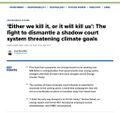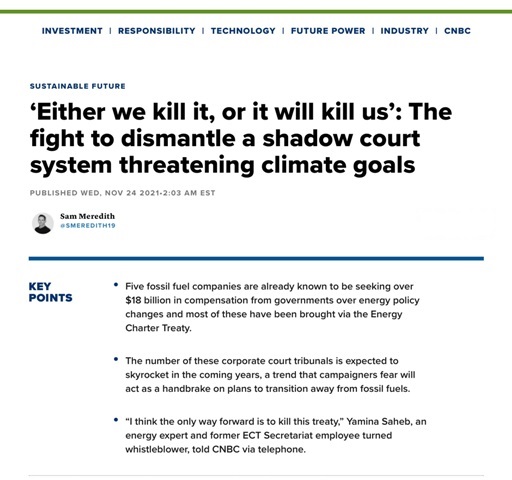File:Energy Charter Treaty.jpg
Energy_Charter_Treaty.jpg (512 × 480 pixels, file size: 74 KB, MIME type: image/jpeg)
Energy Charter Treaty
○
Via CNBC / MSN
'Either we kill it, or it will kill us': The fight to dismantle a shadow court system threatening climate goals
○ ○ ○ ○ ○ ○
Via Wikipedia
The Energy Charter Treaty contains a comprehensive system for settling disputes on matters covered by the treaty. The two primary forms of binding dispute settlement are state-state arbitration on the interpretation or application of almost all aspects of the treaty (except for competition and environmental issues), and investor-state arbitration (Article 26) for investment disputes. There are special provisions, based on the WTO model, for the resolution of inter-state trade issues and the treaty also offers a conciliation procedure for transit disputes. The Secretariat maintains legal advice to these arbitrations as well as has responsibility for maintaining the Travaux préparatoires used to clarify the intentions of the treaty by Article 32 of the Vienna Convention on the Law of Treaties.
The Secretariat maintains a publicly available list of cases that have been brought by investors to international arbitration. These cases have been litigated under the arbitration regulations of the ICSID, Arbitration Institute of the SCC, and UNCITRAL. The Arbitration Awards or Settlements are sometimes in the hundred of millions of dollars. Disputes concerning competition (Article 6) and environmental issues (Article 19) the Secretariat provides for bilateral (in the case of competition) or multilateral (in the case of environmental protection) non-binding consultation mechanisms.
Criticism
The Energy Charter Treaty has come under heavy criticism for being an obstacle to the transition to renewable energy. Transnational corporations who have invested in fossil fuel production and nuclear power can sue national governments for loss of profit on their investments as a consequence of the transition to renewable energy. Critics argue that the Energy Charter Treaty has a chilling effect on energy-related legislation. This is part of a broader debate about Investor-state dispute settlement mechanisms in free trade agreements.
For example, the German energy company RWE has sued the Dutch government for €1.4 billion in compensation for the phasing out of coal power plants.
"The EU Commission wants [the treaty] modernized, the UK government agrees with the EU[...]. The government in Pretoria [South Africa] has dismissed approaches by treaty representatives. Mustaqeem de Gama, Counsellor at the South African Mission in Geneva, [...] believes other African countries should beware: 'The Treaty [...] imposes further restrictions and obligations on countries that may close off policy space available to them[...]. In many cases a company invests in a country and, at the first sign of trouble, they declare an international dispute. They basically circumvent local legal proceedings[...]’"
With claims already being seen in the billions of dollars, just the threat of an investor suing can cause watering down of climate policy. The modernization process is moving at a snail’s pace.
More:
- https://www.bloombergquint.com/business/big-coal-tapping-obscure-treaty-could-chill-green-revolution
○
File history
Click on a date/time to view the file as it appeared at that time.
| Date/Time | Thumbnail | Dimensions | User | Comment | |
|---|---|---|---|---|---|
| current | 20:48, 24 November 2021 |  | 512 × 480 (74 KB) | Siterunner (talk | contribs) |
You cannot overwrite this file.
File usage
The following page uses this file:
- Air Quality
- Air Pollution
- Agriculture
- Alternative Agriculture
- Antarctica
- Anthropocene
- Arctic
- Atmospheric Science
- Citizen Science
- City Governments
- Climate Change
- Climate Migration
- Climate Policy
- Countries
- County Governments
- Desertification
- Digital Citizen
- Earth Imaging
- Earth Observations
- Earth360
- Earth Science
- Earth Science from Space
- Earth System Science
- Ecology Studies
- Eco-nomics
- Economic Justice
- Education
- Energy
- Environmental Laws
- Environmental Protection
- Environmental Security
- Environmental Security, National Security
- ESA
- European Union
- Externalities
- Extinction
- Food
- Forests
- Fossil Fuels
- Greenland
- Global Security
- Global Warming
- Green Graphics
- Green Networking
- Green Best Practices
- Green Politics
- Health
- INDC
- Maps
- Money in Politics
- NASA
- NOAA
- Natural Resources
- Networking
- New Definitions of National Security
- New Economy
- New Space
- Oceans
- Ocean Science
- Online Education
- Planet Citizen
- Planet Citizens
- Planet Citizens, Planet Scientists
- Rainforest
- Renewable Energy
- Resilience
- Sea-level Rise
- Sea-Level Rise & Mitigation
- Seventh Generation Sustainability
- Social Justice
- Soil
- Solar Energy
- Strategic Demands
- Sustainability Policies
- Threat Multiplier
- United Nations
- US
- US Environmental Protection Agency
- Water Quality
- Whole Earth
- Wind Energy
- World Bank
- World Wide Web
- Youth
